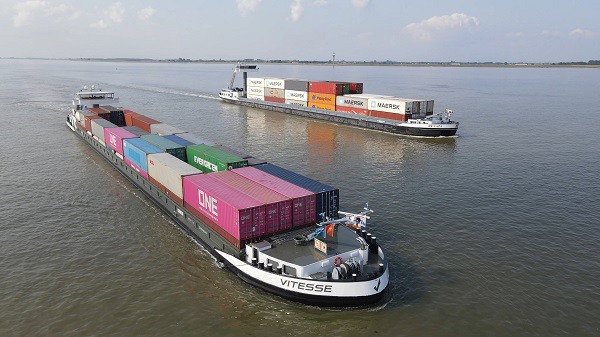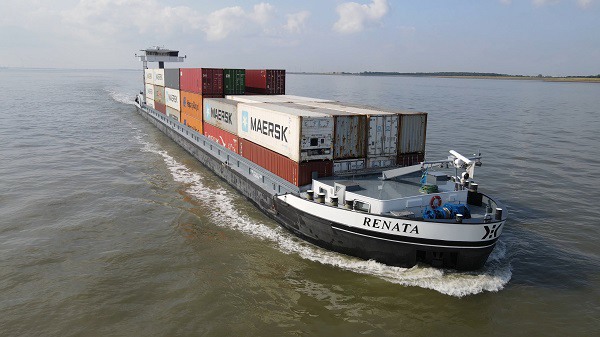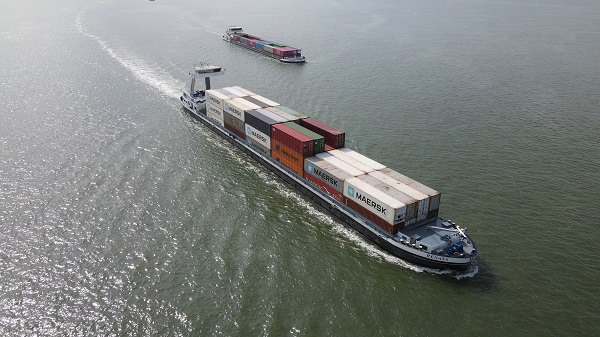No one knew what congestion was 15 years ago when Henri Honkoop started Honkoop Barging with one container shipping boat. Today, this Dutch company charters barges that can hold up to 500 containers. "We transport these containers on Dutch and Belgian inland waterways and the port areas on these vessels," he begins.
 Honkoop Barging ships about 5,000 TEUs (Twenty-foot Equivalent Units) per week
Honkoop Barging ships about 5,000 TEUs (Twenty-foot Equivalent Units) per week
"Ten percent of the containers are fruit and vegetables, with French fries, bananas, and onions being the main products. Our crafts are equipped with reefer connections, so the cold chain remains uninterrupted."
Honkoop Barging does the so-called last miles inland from the ports of Rotterdam, Antwerp, and Vlissingen. "For example, bananas arrive from Costa Rica in containers at the port of Rotterdam, and we transport them by barge to BCTN's terminal in Alblasserdam."
"We take French fries from the CTU terminal in Lewedorp to Lelystad, and onions go from the port of Vlissingen to Rotterdam and Antwerp. We also regularly sail to Ghent and Terneuzen [in Belgium], and we transport many containers within the Port of Rotterdam, from one terminal to another," explains Henri.
Why use a barge?
He says sustainability is the main reason for choosing barge transportation. And since large volumes can be transported at once, it is cheaper too. "And with far fewer CO2 emissions. Safety and reliability, especially nowadays, also play a role. And we don't have to deal with traffic jams and road works."
"Water transport is a genuinely attractive alternative to road transport, especially in a ‛water country' like the Netherlands. It has more kilometers of waterways than highways, and the transshipment locations and shipping companies network offers many opportunities," Henri says.
 It is mainly onion exports that make the second half of the year hectic
It is mainly onion exports that make the second half of the year hectic
Honkoop Barging ships about 5,000 TEUs (Twenty-foot Equivalent Units) per week. "And we're not even a big player in this sector. Water transport has increased considerably. The pandemic caused a dip in 2020, but there's generally a six percent increase. Global trade is booming, which is reflected in the volumes. There's increasing demand for temperature-controlled cargo because the usual fruit ships are far more expensive than container transport."
"Ten years ago, we weren't transporting any containers of onions, and five years ago not one container of bananas, so those are huge developments," Honkoop continues. Things are different now. Onion exports make the second half of the year particularly busy. There are non-stop back-and-forth sailings from Vlissingen to Rotterdam and Antwerp. It is, therefore, essential for this logistics service provider to always have enough empty containers available for loading in Vlissingen.
Strengthening inland shipping's position
When chartering barges, Honkoop Barging has to match cargoes as best it can and within certain timeframes so as to use the vessels' capacity as optimally as possible. Seaport delays sometimes make this difficult; that highlights the unequal position between sea and inland shipping.
"Shipping companies determine the handling at sea terminals. And then 'who pays, decides' usually applies. Barges are always next in line to large seagoing vessels. That means loading and unloading are being done later than planned more often. That creates pressure, especially when it comes to reefers. This major challenge is concerning."
 “Transport via waterways requires a different way of thinking”
“Transport via waterways requires a different way of thinking”
To combat congestion at ports like Rotterdam and Antwerp, it is vital that inland shipping costs begin including transshipment at all container terminals, says Henri. "Then we'll no longer have to depend on the shipping companies for loading and unloading. And that will level sea and inland shipping's playing field. You could compare it to buying landing rights at airports. Inland shipping adds significant value to the logistics sector and should receive far more credit," he adds.
Increasing world trade causing additional pressure
Henri is referring to his sector helping solve issues like traffic jams and other difficulties facing the transport sector, such as the acute driver shortage. "Road transport simply cannot cope with the increasing volumes, especially when compared to water transport capacity. And that keeps growing. New seagoing vessels are being built, which, in turn, offers opportunities for inland navigation. The question is whether Europe's infrastructure is ready for so many more containers. There's already noticeable pressure on the entire chain," he says.
There are plenty of benefits to choosing barge transportation, then. Still, that is easier said than done because, according to Henri, businesses are often still skeptical. "You need to think differently. Customers are used to same-day delivery with road transport. Water transport takes slightly longer."
"But capacity and efficient planning around, say, staff deployment, yield profits. That's why we always start by looking, together with our clients, at how they can save on transport costs by using inland shipping intelligently in their transport chain," he concludes.
CO2 emission reduction is a hot topic in the shipping industry too. Henri follows these developments eagerly. "There will come a time when we can choose - hydrogen or electric? That's all still in its infancy. Ships' longevity is a limitation. We have a vessel that's been in service for 70 years. You write a truck off after seven years. I consider electric power as an interim step and hydrogen as the future, but that could all change at any time."
 Honkoop Barging
Honkoop Barging
Willem Barentszstraat 1
3165 AA Rotterdam
T: +31 (0)10 - 2833930
[email protected]
www.honkoopbarging.nl
